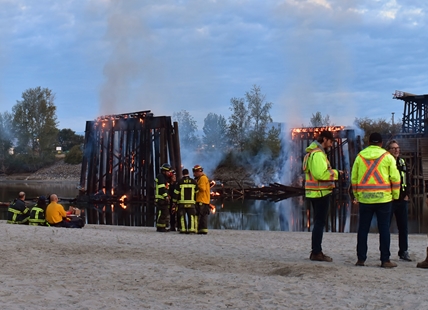Here’s why $600 million doesn’t earn much interest in Kelowna or any B.C. city
Anyone with extra cash to sock away knows to look for the best rate of return on their money. In January, Reuters reported the average return for the world's top 20 hedge funds in 2021 was 10.5% while equity funds soared past 25%. The City of Kelowna, with $623.1 million in investments,...

Anyone with extra cash to sock away knows to look for the best rate of return on their money.
In January, Reuters reported the average return for the world's top 20 hedge funds in 2021 was 10.5% while equity funds soared past 25%.
The City of Kelowna, with $623.1 million in investments, earned 1.67%.
“We continually look for the best returns,” Kevin Hughes, the city’s financial planning manager and the author of a report on investments going to city council on Monday, told iNFOnews.ca. “We also need to manage the risk and, ultimately, we have to preserve the principal of our investments.”
That 1.67% rate of return is actually better than most of the benchmarks a city measures its investments against.
Those benchmarks are quite different from what private or corporate investors deal with because municipal governments throughout B.C. exist under strict investment rules.
First and foremost, they must protect their principal amounts.
That’s not the case with anyone playing the stock market – whether that’s through individual stocks and bonds or through pooled funds. In those cases, investors could lose all their money if a stock fails.
Municipalities have to protect the dollars they are given to hold onto for their citizens. Those include monies paid by developers that can sit for years before roads and parks are built. There is also money set aside by city-owned utilities like sewers, water systems and the airport that accumulate for years before funding replacement structures. Funds from some long-term grants may also be invested.
That money can only be invested in funds guaranteed by governments, banks or credit unions, which don’t pay those high rates of return.
The investments are “laddered.” That means, for example, some government bonds take 10 years to mature while others could be five or less. Older bonds, right now, are paying higher rates of return that those purchased in the last couple of years during a time of historically low interest rates.
That means, new money invested this year will likely be in shorter-term vehicles rather than locking into long-term low interest rate bonds.
It’s particularly stark this year since the low rates of return are combined with skyrocketing inflation. The Consumer Price Index is up close to 5% in recent months and the types of things municipalities buy, such as construction materials, are up even more.
Given that scenario, why can’t cities simply invest in the stock market, buy profitable local businesses or make money off things like skating rinks and swimming pools?
Quite simply, those things are not allowed under the province’s Community Charter.
Take the Parkinson Recreation Center – which is in the process of being replaced at a cost of $134 million or more – as an example.
“What we can do is charge a fee to recover costs,” Genelle Davidson, the city’s director of financial services said. “We can charge a fee that may recover all or part of the programming fees, for example. We can also charge a fee that would cover all or part of future infrastructure replacement of a facility.”
What they can’t charge are fees that bring anything extra.
For utilities like sewer, water and the Glenmore Landfill, fees are set high enough to cover replacement costs.
But, to add such costs to swimming pool or fitness centre fees at Parkinson Recreation Centre might just make it unaffordable for far too many residents.
One thing that is unusual for the City of Kelowna is that it does own shares in FortisBC. That’s only because of special permission granted by the province.
The city once owned its own electricity company but, in 2013 sold it to FortisBC and used that money to buy $55 million worth of Fortis shares. Those shares now have a book value of $72.2 million and a market value of $125.1 million and are in a legacy fund, Hughes’ report says.
Davidson isn’t sure if a city could create a new utility, such as an electrical or water system. Certainly it would have to, first of all, prove that local government could do a better and more cost effective job than a private company. Even if it was shown that it could, the province may not allow it.
The reality is, given the existing low rate of return and the skyrocketing costs, the city’s investments are not keeping up with inflation.
Neither Hughes nor Davidson would hint that the city is losing purchasing power, just saying they’re getting the best rate of return possible under the circumstances.
There are some changes in the wind for how local governments are funded. A report by the Union of B.C. Municipalities has won a commitment from the province to develop a better funding model that doesn’t make cities so reliant on taxes.
That talks about changes to things like how provincial services are downloaded to local governments, funding affordable housing and converting transit buses to electricity.
It says nothing about changing the way local governments can invest their reserve funds or bringing in more money by starting up profitable businesses.
To contact a reporter for this story, email Rob Munro or call 250-808-0143 or email the editor. You can also submit photos, videos or news tips to the newsroom and be entered to win a monthly prize draw.
We welcome your comments and opinions on our stories but play nice. We won't censor or delete comments unless they contain off-topic statements or links, unnecessary vulgarity, false facts, spam or obviously fake profiles. If you have any concerns about what you see in comments, email the editor in the link above.

 Valandos
Valandos 















